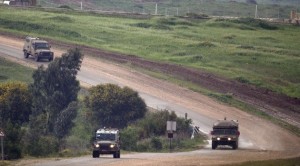Special to WorldTribune.com
JERUSALEM — Iran has been directing its proxies to attack Israel, a report said.
The Jerusalem Center for Public Affairs asserted that Iran was ordering its Palestinian and Lebanese proxies to attack Israel. In a report, the center cited rocket and improvised explosive device strikes along Israel’s borders with Lebanon and Syria in March 2014.

“All of these attacks on Israel come in the wake of the green light given by Iran against the backdrop of changing power equations in the broader Middle East,” the report, titled “Iran’s Fortunes Rising in a Middle East Vacuum,” said.
Author Michael Segall, a consultant and retired Israeli military intelligence officer, said Islamic Jihad was directed by Iran to fire some 150 rockets toward Israel from the Gaza Strip in mid-March. Segall said Jihad, with the largest medium- and long-range rocket arsenal in the Gaza Strip, was “completely dependent on Iran for its funding and equipment.”
“Iran views Hizbullah and the Palestinian terror organizations as major components in its national security strategy, part of its long arm,” the report, dated March 19, said. “Iran acts ceaselessly to provide these actors with rockets and the knowledge to manufacture them, along with other weapons. The latest developments, coupled with Iran’s growing realization that it is immune to a Western military attack, could lead it to make even bolder moves by itself and through its proxies.”
The report said the attacks on Israel reflected growing confidence by Teheran that it would not be attacked by either the West or the Jewish state. The turning point was said to have been the P5+1 agreement in November 2013 that preserved Iran’s nuclear and ballistic missile program.
“Iran regards the U.S., and the West in general, as lacking the capacity to use military force to stop its nuclearization, or to curtail Iran’s assertive measures against the Gulf states and in the Middle East generally. Iran sees an opportunity to continue driving the U.S. and the West out of the region,” the report said.
Segall said Hizbullah, after years of restraint, was also directed to intensify attacks on Israel. On March 18, four Israeli soldiers were killed during a patrol on the Golan Heights near the border with Syria.
“At Iran’s behest, Hizbullah has entered the struggle to salvage Iran’s strategic asset, the Assad regime,” the report said. “Despite growing domestic criticism, in part due to scores of Hizbullah casualties on Syrian soil, [Hizbullah secretary-general Hassan] Nasrallah has been carrying out Teheran’s directives.”
In return, Iran has transferred what the report termed advanced weapons to Hizbullah. This included the Russian-origin P-800 cruise missile and unmanned aerial vehicles.
The report envisioned Iran’s reconciliation with the Hamas regime in the Gaza Strip. Hamas leader Khaled Masha’al was preparing to visit Iran in what could restore Teheran’s military and financial aid to Hamas, which supported the Sunni revolt until 2013.
“Iranian control in Gaza would enable it to more broadly influence its political associates as well as the newly reconstituted Egyptian arena,” the report said.

You must be logged in to post a comment Login